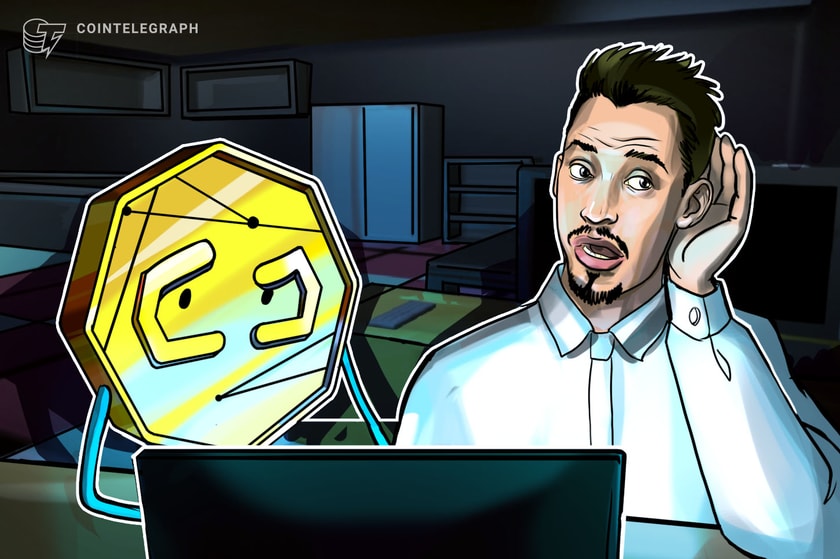 Congressman Warren Davidson has introduced the Evaluating Defi Opportunities Act to foster data-driven regulations for decentralized finance (defi). He stressed the importance of safeguarding innovation and user privacy while addressing concerns over potential overregulation. This proposed study by key financial regulators seeks to balance defi’s growth with oversight, ensuring the sector’s competitive edge and resilience […]
Congressman Warren Davidson has introduced the Evaluating Defi Opportunities Act to foster data-driven regulations for decentralized finance (defi). He stressed the importance of safeguarding innovation and user privacy while addressing concerns over potential overregulation. This proposed study by key financial regulators seeks to balance defi’s growth with oversight, ensuring the sector’s competitive edge and resilience […]
Coin Center said the bill was unconstitutional, while the Blockchain Association called it incompatible with blockchain technology.
Crypto industry advocacy bodies have slammed a newly proposed United States Senate bill for what they say is a confused approach to regulating the decentralized finance (DeFi) sector.
On July 20, crypto think tank Coin Center and crypto advocacy group the Blockchain Association released separate statements describing the legislation as a “messy," "unworkable," and "unconstitutional” way of regulating DeFi.
Introduced on July 18, the bipartisan Crypto-Asset National Security Enhancement Act (CANSEE) bill aims to reign in money laundering violations in DeFi.
If passed, the legislation would extend new penalties to anyone who “controls” or “makes available an application designed to facilitate transactions using a digital asset protocol.” They would also be required to adhere to anti-money laundering and financial reporting standards.
The definition of who or what “controls” a DeFi protocol was left to be made by the U.S. Secretary of the Treasury — a move some pundits say will lead to excessive controls being applied to DeFi.
In its July 20 blog post, Coin Center wrote the bill gives “virtually unbounded discretion to the Secretary to decide what it would take to designate one as having ‘control’ of a protocol.”
Additionally, the think tank declared the bill to be unconstitutional as it would crack down on software developers who — as an extension of free speech — have a First Amendment right to publish code.
We've looked at the new bill by @SenJackReed, @SenatorRounds, @SenatorWarner,
— Jerry Brito (@jerrybrito) July 20, 2023
and @SenatorRomney that would extend sanctions penalties and AML obligations to developers of decentralized protocols. It's unconstitutional and ill-considered. Our analysis: https://t.co/TR2rsAAQHK
Coin Center was also concerned with the scope of the legislation and said by design DeFi is decentralized — meaning it could prove legally troublesome to enforce control over a given protocol.
Related: Liquid staking claims top spot in DeFi: Binance report
Kristin Smith, the CEO of the Blockchain Association echoed Coin Center’s concerns and described the new legislation as unworkable.
Blockchain Association CEO @KMSmithDC released the following statement following today's introduction of the Crypto-Asset National Security Enhancement Act of 2023:
— Blockchain Association (@BlockchainAssn) July 19, 2023
“The Crypto-Asset National Security Enhancement Act of 2023, introduced today by Sen. Jack Reed (D-RI), is an… pic.twitter.com/S65XSUheTW
Smith took aim at the bill for overstating the presence of money laundering in DeFi and crypto more broadly.
“At present, illicit transactions represent a small fraction of total volume: only 0.24% of all digital asset transactions in 2022, far less than in traditional finance.”
Smith said federal law enforcement agencies are already equipped with the tools and expertise to combat this “relatively small but important issue.” Ultimately, Smith denounced the new punitive measures in the bill as redundant.
While crypto organizations have taken aim at the broad scope of the bill, an April 7 U.S. Treasury report found many DeFi protocols are more centralized than claimed, often featuring a high concentration of funds and voting power in the hands of a few token holders.
Magazine: How smart people invest in dumb memecoins — 3-point plan for success

A crypto bill that industry advocates previously said would “kill DeFi” has seen an updated draft released online with one commentator saying the U.S. is “finally getting their act together.”
A new draft of the Digital Commodities Consumer Protection Act (DCCPA) bill has started to circulate online, with some commentary suggesting it could be positive for decentralized finance (DeFi) and crypto.
A prior draft version of the bill drew heavy criticism from industry representative bodies for containing too broad a definition for a “digital commodity platform,” which “could be interpreted as a ban on decentralized finance (DeFi).”
In a newly posted 31-page draft bill, shared by Delphi Labs general counsel Gabriel Shapiro, the lawyer said he made the draft bill publicly available as he believes in “transparency and open discussion.”
Shapiro remarked on a section amending the meaning of a “digital commodity trading facility” which excluded persons who develop or publish software, commenting that it “could be a boon” to DeFi and crypto.
Notably, this version contains a limited exception to the term "digital commodity trading facility" which would exclude persons who solely develop or publish software--this could be a boon to DeFi/crypto. pic.twitter.com/0pa843RJ9h
— _gabrielShapir0 (@lex_node) October 19, 2022
Dr. Martin Hiesboeck head of research at crypto exchange UpHold tweeted that the newly released draft seems to follow similar regulations in the European Union and the United Kingdom, suggesting that the United States is “finally getting their act together.”
First impression: leaked #CFTC Bill seems to follow UK/EU reg in broad strokes even though it uses similar somewhat different terminology. Will prepare a detailed report by tomorrow. US finally getting their act together. All good.
— Dr Martin Hiesboeck (@MHiesboeck) October 19, 2022
The comments are a change of tone from the previous version of the bill, which was described by Web3 incubator and advocacy group Alliance DAO as one that “kills DeFi.”
The decentralized autonomous organization (DAO) wrote the bill “creates a compliance architecture that precludes the concept of a system of smart contracts operating decentralized infrastructure with little or no reliance on human activity,” as it required people to enforce compliance with the regulations.
Related: ‘Time is not on our side’ to provide regulatory clarity on crypto — US lawmaker
There have long been calls for regulatory clarity regarding digital assets in the U.S. with some calling on the U.S. Congress to pass legislation defining commodities and give jurisdiction to the CFTC.
First introduced in August the DCCPA extends the regulatory power of the Commodities Future Trading Commission (CFTC) on the cryptocurrency industry and attempts to define certain cryptos, such as Bitcoin (BTC) and Ether (ETH) as commodities rather than securities.